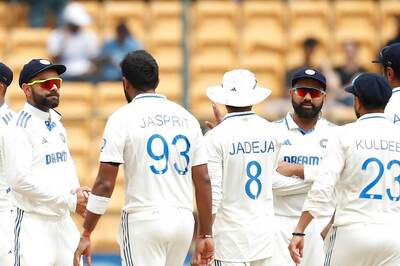
views
I was one of the fortunate ones to breastfeed my child for over a year. I also nursed in public, sometimes worried about what others would say and at other times, completely unfazed.
My confidence would have been half of what it was if not for the support system my husband provided. It may sound unusual to most but a father can play a major role in the raising of a child without being the primary caregiver.
Various researches done and collated in a 2015 report titled State of the World’s Fathers throws up evidence backing this very claim. It is the world’s first report to provide a global view of men’s contributions to parenting and caregiving under the MenCare campaign.
According to the report, it was seen that engaging men in child-health programs in South Asia led to increased child immunization rates and lower prevalence of stunting (low height for age).
These programmatic experiences suggested that the more fathers know, the more they can care for their children’s health. In high-income countries, fathers’ presence was shown to be helpful in encouraging and supporting mothers to breastfeed.
Researchers in a study at Brigham and Women’s Hospital in Boston, United States, found that 74 percent of mothers whose partners attended classes about breastfeeding continued to feed their babies in this way, compared with only 41 percent of mothers whose partners attended a control class.
Research in Uganda found that men influenced women’s decisions about whether and for how long to breastfeed, but often lacked sufficient information on the benefits of breastfeeding.
In Vietnam, an intervention to increase exclusive breastfeeding provided men with breastfeeding education materials and counselling. Researchers found that women whose partners received the materials and counselling were more likely to be exclusively breastfeeding their child at four and six months, compared to women whose partners did not.
In India, as nuclear families become the norm, the responsibility of the father increases in every aspect of child rearing. He is the most constant companion around the new mother during the pre and post natal period.
And among the most important initiatives during infancy is breastfeeding. "A father can help a breastfeeding mother in many ways. He can take care of the older children, manage the household and provide care for his wife. These can ease a woman's stress and help her breastfeed their child successfully. Introduction of solid food to the baby can start after 6 months and a father can further provide the complementary feeding to his baby," says Revathi, coordinator, maternity/parental protection campaign & gender, World Alliance for Breastfeeding Action (WABA)
Mrinalini Banerjee, mother to a two year old, vouches for the breastfeeding support she received from her husband, especially when she joined work.
"I would pump milk and store it in the fridge. My husband would return from work, thaw the stored milk and feed our son. We carried this out for over six months and am glad we contributed together to reach our child’s growth goals,” says the IT professional.
Infact, one finds several positive trends among younger men who wish to be more active in their parenting – many give up smoking and alcohol, choose vegan lifestyles and even start exercising to be fit.
And research says it is only scientific that they do so. "It has been found that changes in pre-frontal cortex brain activity in new fathers are virtually identical to the brain activity found in mothers. The conclusion emerging from this research is that men and women are equally wired for care.
To those who think women have an innate ability or proclivity to care for children, this research shows that men have an equivalent or, at the very least, similar proclivity to care for children, states the report.
Then what makes most fathers take a backseat? Mainly, it is our perceived definitions of what each parent ‘should’ do. Men choose to take a lighter role in parenting because societal norms prompt them to do so.
But there have been steps in the right direction, from advertisements that show men taking on household work to fathers dedicating their time and energy to support their wives breastfeed, especially in public spaces.
And the road ahead will hopefully, only get better.




















Comments
0 comment